Dell Studio XPS 16: the Eyes Have It
by Jarred Walton on April 2, 2009 6:00 PM EST- Posted in
- Laptops
Power Requirements
Power requirements with a laptop plugged in don't necessarily reflect power requirements when a laptop is on battery power. In particular, high-end GPUs run at lower maximum clock speeds when using the battery. Keep this in mind when looking at the following numbers. We test under idle conditions, with a 100% load placed on the CPU via Folding@Home SMP, and finally at maximum load by running FAH SMP at the same time as we loop 3DMark06 (at the native LCD resolution).
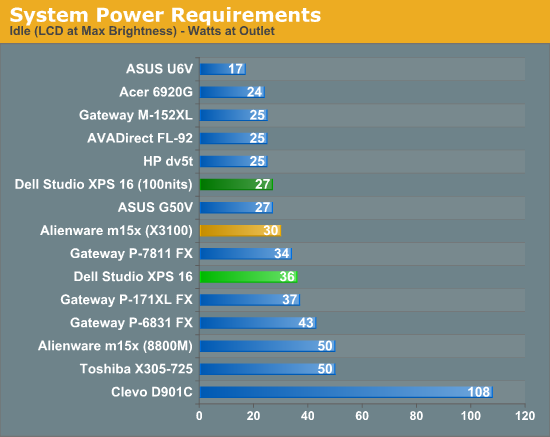
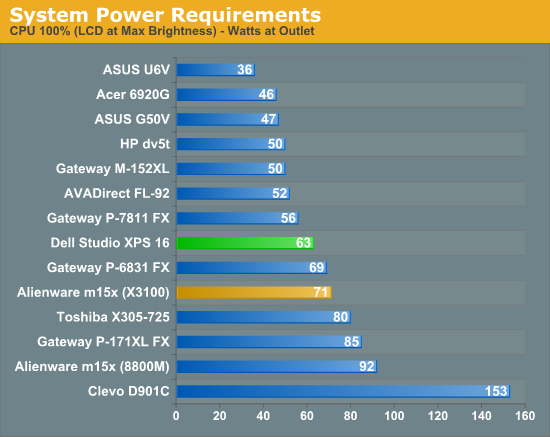
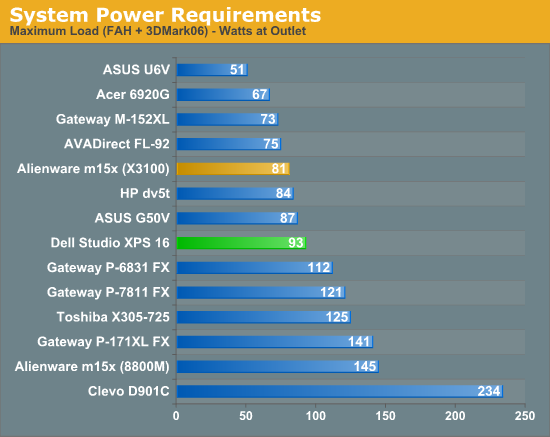
Our power measurements are with the LCD at maximum brightness, which isn't necessarily a fair way of doing things as some LCDs are much brighter than others. Unfortunately, we don't have most of the laptops around to retest. You can see that the Dell Studio XPS 16 uses 9W more power running at maximum brightness, which represents an increase in power draw of 33%. We verified that 9W figure on the other tests, but we didn't include those results in the charts. We don't know if the RGB LEDs inherently use more power than regular laptop backlights, but obviously increasing the backlight intensity requires more power. Luckily, you can often get by running the XPS 16 LCD at around 30-40% brightness (100-130 nits).
Noise Levels
We also ran noise testing using an SPL meter at 24" under the same conditions as our power tests.
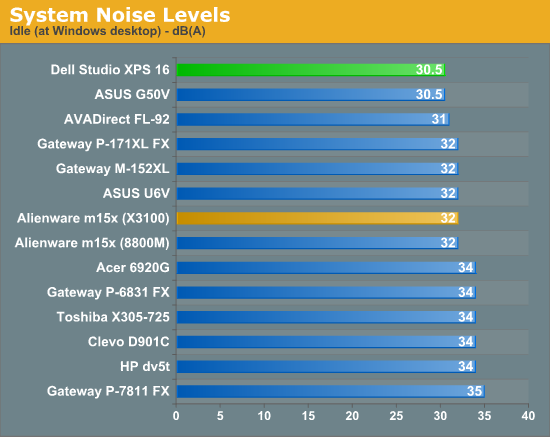
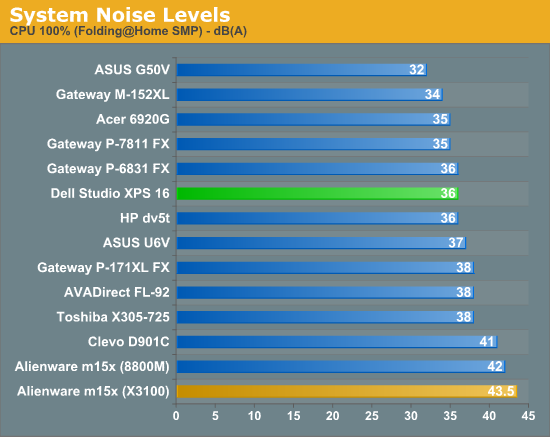
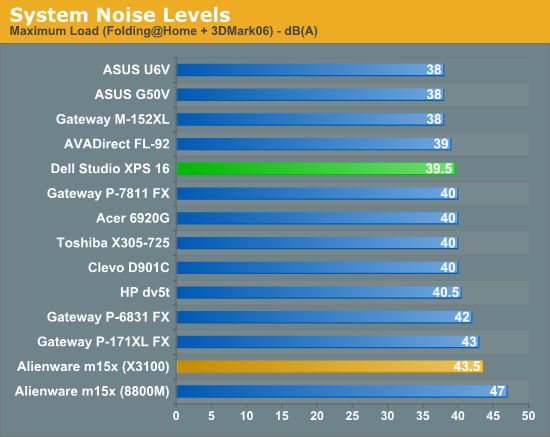
The Studio XPS 16 does reasonably well in terms of noise levels, almost reaching the noise floor of our testing environment (around 28 dB). Once you start to put a load on the system, it does get a bit louder, and extended gaming will usually reach maximum noise levels after a few minutes. The system also takes a while to quiet down after you remove the load, which is likely influenced by the top panel partially blocking the exhaust port.
Temperatures
We didn't create any charts, but we wanted to give a quick rundown of the temperatures you might expect from the Studio XPS 16. We placed a maximum load on the system for 30 minutes and then measured temperatures, so these results are something of a worst-case scenario. Then again, the testing environment was only 67°F, so in warmer conditions it might not be as difficult to make things toasty. We have heard some complaints from users about the XPS 16 getting excessively hot; we wouldn't go that far, but it definitely doesn't run cool to the touch all the time.
We measured temperatures of ~45°C at the exhaust, which isn't too bad. However, temperatures on the bottom of the laptop range from 35° to the 45° as well, with large portions of the bottom measuring above 40°C. The keyboard and palm rest weren't quite as hot, ranging from 30° to 40°C with most of the keyboard staying under 35°. Just to put things in perspective, those temperatures are higher than what we measured on the Toshiba X305-Q725, a result of the smaller chassis with fewer fans.










79 Comments
View All Comments
JarredWalton - Tuesday, April 7, 2009 - link
I can't imagine Samsung is going to make a drive for OEMs where they charge $400, and it's so great that people will want one outside of a new system build... but then the price will be $1000 at retail. That's a 250% markup, which just seems too much. If it does happen that way, well, only a crazy person would spend $1000 for a drive that you can get for $400 with a new laptop. I think it will just be a couple months before the drives show up in quantity at retail (under a variety of brand names), and then prices will drop to whatever Dell is charging. 'Course, I could be wrong! (Wouldn't be the first time....)JarredWalton - Tuesday, April 7, 2009 - link
Updated the text for you, regardless.MadBoris - Tuesday, April 7, 2009 - link
I think it's only fair you didn't dis the drive for the same reason you can't recommend it, that it wasn't tested. So I think the change you made will benefit future readers.Although I have made all my points...which outside of testing are just here say.
You are thinking in terms of markup in your last comment. If it ever comes out in retail it will be close to the performance and compete with the Summit, by then pricing will have to be more competitive than the $999 MSRP of the Summit, as they will compete. Still, the point isn't how much it would be marked up to, the point is how big of discount Dell is providing on this drive when they could charge much much more. It's a steal, but don't tell Dell I told you or it will change. It's like the celery 300a I got for $100 that out performed the fastest $800 chips, it was one of those bargains you come across, but with this one I don't have to do any tweaking.
In 2 months there has not been any serious testing done on this drive unfortunately so it has been silently waiting for people.
I consider all canned benchmarks crap when it comes to SSD's, even the best eye of those who follow SSD's can't truly interpret real world performance. Only real world tests and scripts will reveal anything pertinent.
But here's a couple numbers of canned tests since that is all there is...
I started a page for it at notebook review, that never took off and
I stopped supporting a couple months back. Some charts there...
http://forum.notebookreview.com/showthread.php?t=3...">http://forum.notebookreview.com/showthread.php?t=3...
One of the only decent reviews is at RegisterHardware where it got an editors choice...But it's mostly misleading canned tests compared to x-25m and a couple others.
http://www.reghardware.co.uk/2009/03/17/review_sto...">http://www.reghardware.co.uk/2009/03/17/review_sto...
I think your text changes did a service to readers, rather than dissing it before you know what it really is.
Joelist - Sunday, April 5, 2009 - link
Hi Jared,I like you think the Intel is best of breed.
However, in the name of fairness the 256GB Samsung needs to be tested. I would imagine that if you and Anand contacted Dell and/or Samsung you should be able to get a sample unit for review.
JarredWalton - Monday, April 6, 2009 - link
Anand is the man in charge of SSD testing, so that's his baby. I would guess that after the last SSD Anthology, there are plenty of companies interested in sending him more drives for testing. Samsung will be one of those, certainly, and there will be a follow-up down the road. Given he worked for about two months (more?) on the last article, it might be a while before the situation is clear. FWIW, many people are very happy even with JMicron "garbage" SSDs. Just because a lot of people don't have issues doesn't mean the issues aren't there. A lot of people just don't notice the low level delays.Joelist - Monday, April 6, 2009 - link
It's good to know Anand will be looking at this SSD in the future, as it's new controller, cache and firmware make it easily the best SSD other than Intel.I havetested it in exactly the "stutter" scenario Anand described, and there is no stutter. no hesitation at all. I suspect the new controller plus the large cache are responsible.
MadBoris - Sunday, April 5, 2009 - link
"I've updated the text to clarify, but even the Samsung SSDs aren't perfect, as seen here. I stand by the recommendation that if you really want an SSD, read Anand's article and then purchase one on your own. Personally, I wouldn't even consider anything less than the Indilinx options, but I'd try for the Intel models."You have no idea what you are missing, but unless you really followed this laptop and the debut of the 256GB SSD, which I did a couple months back, then it's no surprise.
This new 256GB SSD is not to be confused with prior Samsungs like the 128GB SSD which is utter junk by comparison. This is the new 256GB Samsung SSD, with new controller, and it is a beast! It's MLC, while Intel is faster in certain areas, this is the first SSD I would consider for price/performance/storage.
People are completely clueless about this 256GB SSD, because it's not in retail channels and yet is available for "only" a $400 upgrade.
Model: PM800 2.5" 256GB
Controller: 3C29RBB01-YK40
Size and power: 2.5", 2.9 oz, 1.1 watts.
Quoted Specs: Read:200-220 MB/s Write:160-200 MB/s
Erase cycles: Run to 100GB per second.
Some buy the cheap Dell laptop to turn around and sell the SSD for $800 - $1000.
It's a best kept secret for that price/performance which even a lot of laptop reviewers don't seem to know. ;)
It's not available in retail channels although OCZ is branding off the Samsung tech that lives in this 256GB SSD.
With all your SSD coverage too bad you guys missed out on this jewel.
Joelist - Friday, April 3, 2009 - link
Hi Jared,The Samsung SSD in the Studio XPS is their next gen one, with different firmware and such from the one Anand reviewed. This is the Computerworld review:
http://www.computerworld.com/action/article.do?com...">http://www.computerworld.com/action/art...viewArti...
While I still think Intel SSDs are the best, this one is no slouch. And the next time Anand does SSD reviews he should review this one as well. Just my 2 cents.
JarredWalton - Friday, April 3, 2009 - link
I thought the OCZ Summit was the new Samsung chip and firmware?Joelist - Friday, April 3, 2009 - link
The Summit has a Samsung chip, that is true. This SSD is the actual Samsung SSD that they make in partnership with Dell. So it may be the same but may be different.As stated,it does not pause or stutter at all. Performance is very smooth and fast.